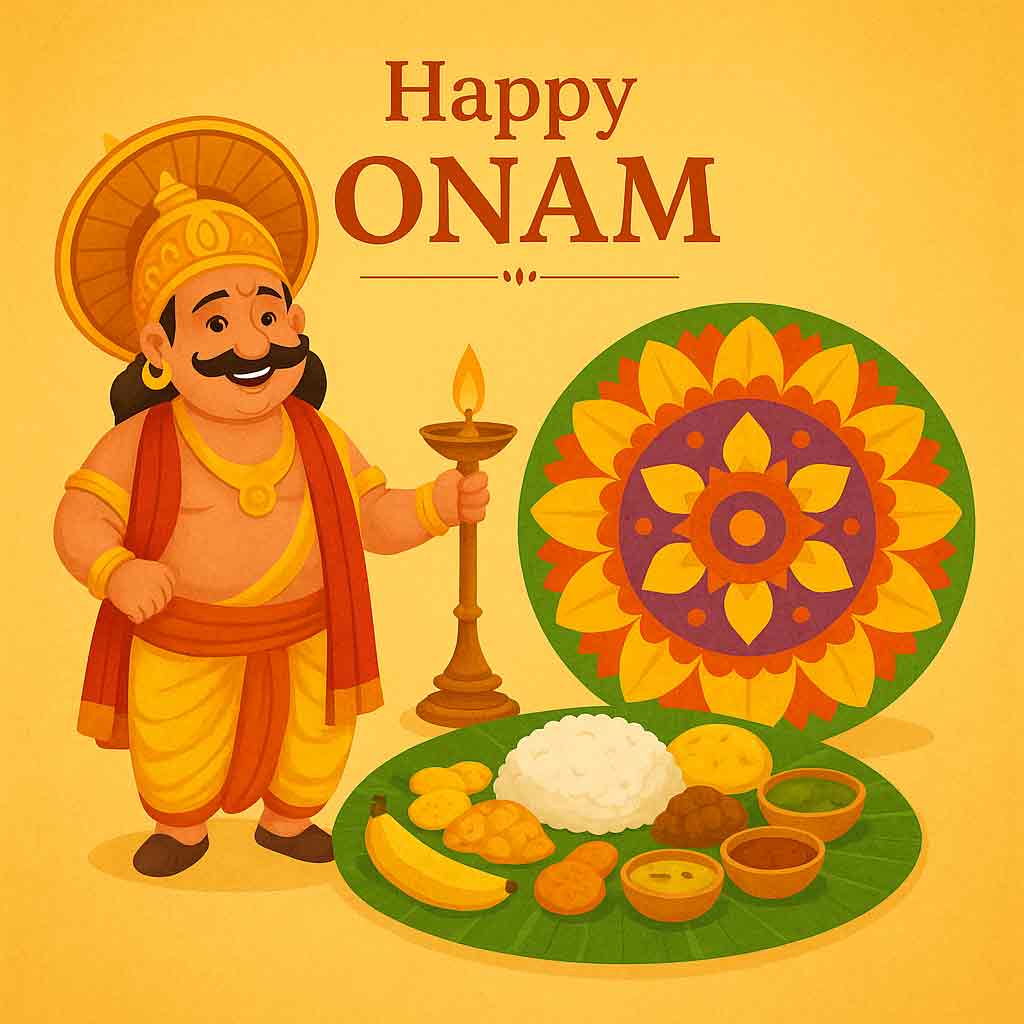Onam (August–September)
The Festival of Harvest, Harmony, and Heritage

Onam is one of the most vibrant and cherished festivals of Kerala, celebrated with immense enthusiasm, cultural splendour, and unity among people of all communities. It marks the annual homecoming of the mythical King Mahabali, whose reign is remembered as a golden age of prosperity, equality, and happiness. The festival, which usually falls in the Malayalam month of Chingam (August–September), is Kerala’s official state festival and symbolizes the spirit of togetherness, harmony, and gratitude for nature’s bounty. Onam is not just a festival — it is a cultural experience that reflects the very essence of Kerala’s traditions, arts, and community life.
The legend behind Onam is rooted in Hindu mythology. King Mahabali, an Asura (demon) king, was known for his generosity, justice, and devotion to his people. His reign brought prosperity and peace to the land, and everyone lived happily without discrimination or sorrow. However, the gods grew concerned that Mahabali’s fame and power were surpassing theirs. To humble him and restore cosmic balance, Lord Vishnu took his fifth avatar as Vamana, a dwarf Brahmin. When Mahabali offered him a gift, Vamana asked for three paces of land. With two steps, he covered the earth and the heavens, leaving no space for the third. The noble Mahabali then offered his head for the final step, and Vishnu sent him to the netherworld (Patala). Impressed by his devotion and humility, Lord Vishnu granted Mahabali permission to visit his people once every year. Onam commemorates this annual visit, celebrating the time when the beloved king returns to see his prosperous and joyful kingdom.
The ten-day festival of Onam begins with Atham and concludes with Thiruvonam, the most auspicious day. The celebrations are marked by elaborate rituals, traditional games, cultural performances, feasts, and decorations. One of the most iconic symbols of Onam is the Pookalam, a beautiful floral carpet designed in intricate patterns at the entrances of homes. Each day, fresh flowers are added, creating a colourful and fragrant welcome for King Mahabali. The Pookalam symbolizes harmony, creativity, and the community’s collective joy.
Another highlight of Onam is the grand Onam Sadya, a traditional vegetarian feast served on a banana leaf. It includes a variety of delicious dishes — from avial, sambar, olan, and thoran to crispy pappadam and sweet payasam. The Sadya represents abundance and gratitude for nature’s harvest and is enjoyed with family and friends, reinforcing the values of sharing and togetherness.
The festival also showcases Kerala’s rich cultural heritage through music, dance, and sports. Traditional art forms such as Kathakali, Thiruvathirakali, Pulikali (the tiger dance), and Vallamkali (the famous snake boat race) are performed across the state. Vallamkali, in particular, captures the spirit of Onam — hundreds of oarsmen row their long, decorated boats in perfect rhythm to the beat of drums, cheered on by thousands of spectators. These events are not merely entertainment; they are expressions of Kerala’s communal harmony, teamwork, and cultural pride.
Onam also has a deep philosophical meaning that transcends religion. It celebrates the virtues of humility, generosity, and righteousness as embodied by King Mahabali. The festival reminds people that true prosperity lies not in wealth but in kindness, unity, and mutual respect. It is a time when people forget social differences and come together as one community, decorating their homes, exchanging gifts, and rejoicing in the spirit of equality.
In modern times, Onam has evolved into a global celebration of Malayali culture. People of Kerala, wherever they live — across India or abroad — observe the festival with the same devotion and joy. Onam bridges generations and geographies, keeping alive the values of harmony and gratitude that define Kerala’s identity.
Ultimately, Onam is a celebration of life — of good harvests, moral virtue, and cultural pride. It reminds everyone of a utopian time under a noble ruler when happiness, fairness, and prosperity prevailed. As the lamps glow, the Pookalams bloom, and the aroma of Onam Sadya fills the air, every heart in Kerala and beyond welcomes King Mahabali with love and says, “Maveli naadu vaneedum kaalam, manusharellarum onnu pole” — “When Mahabali ruled the land, all people lived as equals.”
